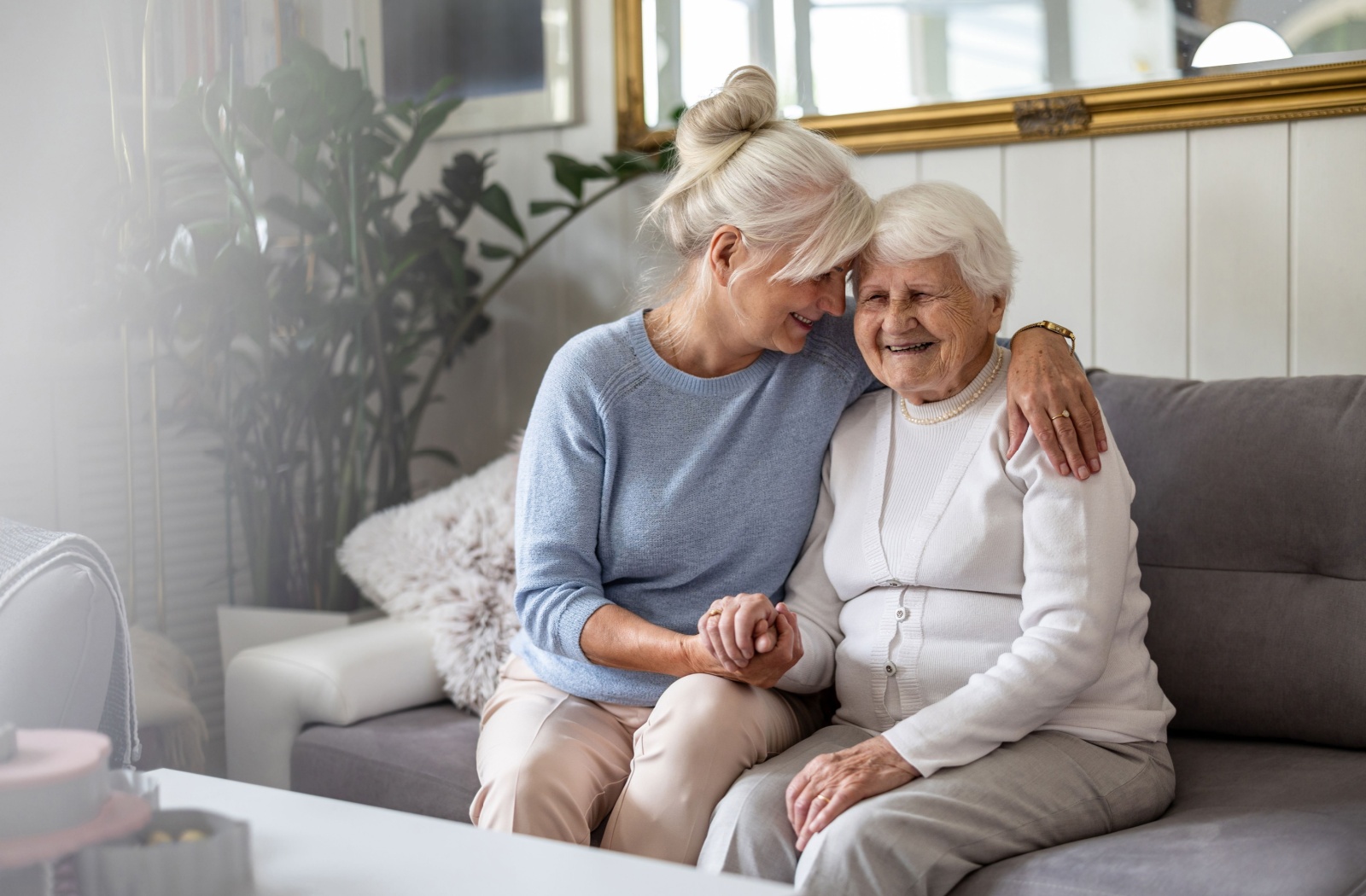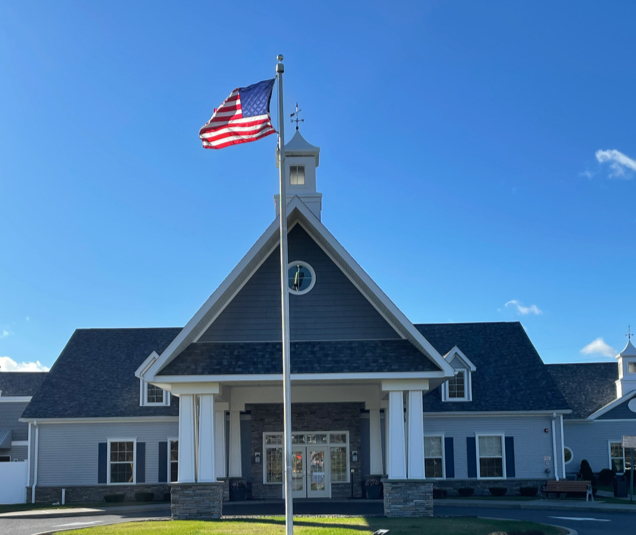Watching a parent’s memory fade can be painful, often prompting difficult questions about how best to support them. For many families, this journey includes the decision to explore memory care options, a step that ensures specialized care for those with dementia or Alzheimer’s disease.
Memory care is a specialized type of senior living designed for those with Alzheimer’s disease and other forms of dementia. Dementia is a progressive condition that affects memory, thinking, and reasoning. Unlike simple forgetfulness, dementia symptoms become severe enough to interfere with daily life and personal safety.
Memory care communities provide 24-hour support and assistance, catering specifically to individuals who require constant supervision and help with daily tasks.
So how do you know if it’s time for your loved one to consider memory care? Here are some signs that suggest they should make the transition:
- Changes in behavior
- Difficulty completing daily tasks
- Safety concerns (including wandering)
- Frequent confusion or disorientation
- Inability to manage medications properly
- Decline in personal hygiene
- Increased need for medical attention
- Family caregiver burnout
Signs It May Be Time for Memory Care
Changes in Behavior
One of the first signs that it may be time for memory care is a noticeable change in your loved one’s behavior. This can manifest in a variety of ways, such as increased agitation, aggression, or withdrawal from social activities. These changes are often due to the progression of Alzheimer’s or another form of dementia and may require specialized care.
Difficulty Completing Daily Tasks
Another sign that it may be time for memory care is if your loved one is having difficulty completing the daily activities of living. This could include forgetting how to do simple things like cook a meal, get dressed, or take a shower. As cognitive abilities decline, it becomes increasingly challenging for those with dementia to perform these tasks independently.
Safety Concerns
Safety concerns are also important to consider. Those living with dementia may forget to turn off appliances, leave the stove on, or wander outside and become lost. This can put them at risk of harm and may require constant supervision to ensure their safety.
In fact, wandering is a common sign of Alzheimer’s and other forms of dementia. If your loved one has started wandering or is getting lost in familiar places, this may be a sign that they need more specialized care.
Memory care communities are designed with wandering in mind, and offer simplified floor plants that help prevent residents from getting lost or leaving the community unsupervised.
Frequent Confusion or Disorientation

As dementia progresses, confusion and disorientation become more frequent and severe. Your loved one may not recognize their surroundings or the people around them, which can be distressing for both them and their family members. Memory care communities have trained staff who are experienced in managing these symptoms and providing a calm and supportive environment.
Inability to Manage Medications Properly
Managing medications can become a challenge for those living with dementia, as they may forget to take their medication or take the wrong dose. This can have serious consequences and may require constant monitoring and assistance from trained staff.
Memory care communities have systems in place to ensure medications are properly administered and monitored.
Decline in Personal Hygiene
Maintaining personal hygiene becomes increasingly difficult as dementia progresses. Your loved one may forget to bathe, brush their teeth, or change their clothes regularly. This can lead to health issues and discomfort if not addressed.
Memory care communities offer assistance with daily tasks such as bathing, grooming, and dressing to help maintain personal hygiene.
Increased Need for Medical Attention
Older adults with dementia may also experience other health issues that require specialized medical attention. Memory care communities have healthcare professionals on staff who are familiar with these unique needs and can provide appropriate care and treatment.
Family Caregiver Burnout
Caring for a loved one living with dementia can be physically, emotionally, and mentally exhausting. As the condition progresses, the demands on the caregiver increase, often leading to caregiver burnout.
Memory care communities offer respite care services, allowing family caregivers to take a break and recharge while their loved one receives specialized care in a safe and supportive environment. This can also help improve the quality of life for both the caregiver and the individual with dementia.
Compassionate Memory Care for Loved Ones with Dementia at Peregrine Senior Living at Colonie
Memory care communities provide a secure and supportive environment for individuals with dementia that addresses their unique needs. Trained staff, specialized activities, and medical attention ensure that residents receive the necessary support to maintain their physical health, cognitive abilities, and overall well-being.
These communities not only benefit individuals with dementia but also alleviate stress for family caregivers who can rest assured knowing their loved ones are receiving high-quality care. If you or a loved one is struggling with dementia, Peregrine Senior Living at Colonie offers memory care services in a warm and welcoming environment. Contact us today to learn more about our community and how we can support you and your family.













Learn and experience insider tips, considerations and real guidance that only experts can provide in-person!
Hope to see you there! 🙂 ... See MoreSee Less
0 CommentsComment on Facebook
Dining at our community is about more than what’s on the plate—it’s about connection, community, and the joy of gathering together.
Our talented culinary team crafts meals that are both delicious and nutritious, offering flavors that comfort and inspire.
From themed dinners to chef demonstrations, each meal becomes an opportunity to savor the moment and celebrate life’s simple pleasures. 🍴
peregrinecolonie.com/ ... See MoreSee Less
0 CommentsComment on Facebook
Today we celebrate the caregivers—those whose quiet strength and unwavering compassion bring comfort to so many.
We see the difference caregivers make every day: holding a hand, sharing a smile, or offering reassurance when it’s needed most. 💕
Your dedication reminds us that true care goes beyond tasks—it’s an act of love, patience, and humanity.
Thank you for all you do to make the world a more compassionate place.
peregrinecolonie.com/ ... See MoreSee Less
2 CommentsComment on Facebook
Peregrine Cooking Demo with Chef Patrick! 🧑🍳
In honor of the Olympics being hosted in Italy, we learned about the history of Italian cuisine, made our own dough from scratch, and crafted personalized calzones! 🇮🇹 They were delizioso! 😋 ... See MoreSee Less
1 CommentsComment on Facebook
Red roses?? I thought you said wet noses!!
We puckered up for some puppy lovin’ at our Kissing Booth! 💋🐾
Happy V-Day from our cutest valentines, Abby & Charlie! 🐶❤️ ... See MoreSee Less
1 CommentsComment on Facebook
Relationship advice loading 🔄 our ladies shared their words of wisdom while enjoying fresh, homemade chocolate covered strawberries and sugar cookies.
What do you think is the Secret to Love?? 💕 ... See MoreSee Less
3 CommentsComment on Facebook
Happy Valentine’s Day! ❤️
Love takes many forms—between partners, friends, families, and even across generations.
Today we celebrate the love that fills our community: the care shared between residents and team members, the laughter that brightens our halls, and the sense of belonging that reminds us we’re never alone.
May your day be filled with connection, warmth, and heart.
peregrinecolonie.com/ ... See MoreSee Less
0 CommentsComment on Facebook